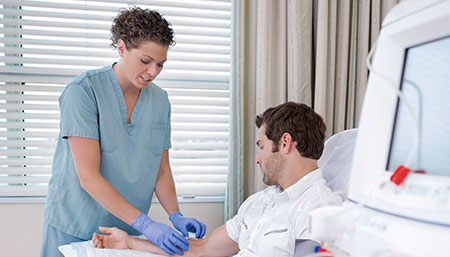Online Healthcare Training Programs and Courses
If you’re interested in a job in the healthcare industry, the first step on your career path could be choosing a training program that’s right for you! Through CareerStep’s online healthcare training programs and courses, you can build the skills and knowledge that can help you prepare to sit for industry-recognized medical certifications!
Through CareerStep’s online healthcare training programs and courses, you can build the skills and knowledge that can help you prepare to sit for industry-recognized medical certifications and stand out to employers!

EKG Technician
Learn how to use state-of-the-art tech to record the electrical activity of the heart and work in a variety of healthcare settings.

Hemodialysis Technician
Discover what it takes to work as a dialysis technician—learn to monitor vital signs, administer dialysis medications, and more.

Medical Assistant
This program is packed with valuable training for aspiring medical assistants.

Medical Laboratory Assistant
Learn how to become certified as a medical laboratory assistant with our comprehensive online training. You'll cover subjects including HIPAA, lab procedures and phlebotomy.

Patient Care Technician
Provide general care and comfort for patients in one of the fastest-growing roles in healthcare.

Pharmacy Technician
Our pharmacy technician training program includes in-depth courses that cover essential topics, including pharmacy law and regulations, business practices, and pharmaceutical calculations.

Phlebotomy Technician
Prepares you to work in hospitals, laboratories, and physicians’ offices—drawing blood for diagnostic testing, transfusions, and more.

Sterile Processing Technician
Learn how to become a Certified Sterile Processing Technician with our comprehensive online training program. You’ll learn medical terminology, sterile processing techniques and best practices, and more.
Healthcare Training FAQs
What is healthcare training?
Healthcare training covers the education, externship* hours, and/or on the job training that is often required to work in most medical jobs, from administrative to clinical roles. Training in healthcare, whether in-person or online, will often cover the foundational topics every healthcare worker should know, such as common medical terminology, and then help you build job-specific skills.
*CareerStep does not guarantee externships. A learner’s placement in and completion of an externship is solely the learner’s responsibility and may be subject to additional requirements, such as a background check and successful completion of a CareerStep course. This is particularly important for learners seeking to complete their externship in Alabama, District of Columbia, Indiana, Louisiana, Minnesota, Nebraska, Nevada, Pennsylvania, Tennessee, Texas, Washington, and Wyoming. Please note that CareerStep will not sign agreements with sites in the above-referenced states or provide evidence of insurance to those sites.
What training and education programs are vital for healthcare managers?
Depending on your specific job title, healthcare managers should have a strong understanding of a number of skills, from leadership skills to specific medical training. Many healthcare managers have a combination of academic and practical training in the field, which allows them to effectively manage a healthcare team in a variety of settings.
Why is education and training important in healthcare?
Education and training are important in healthcare because there are many skills that can’t just be learned through on-the-job training and your level of skill in the field can make a huge difference to patient safety and quality of care. Additionally, the healthcare field is one that is constantly evolving with new breakthroughs and updates in technology, so to be an effective worker in the industry, it’s important to continue to learn and develop your skills even when you’ve already completed a training program and have been working for years.
What is the easiest healthcare certification to get?
Most healthcare certifications aren’t easy to get. They involve completing education requirements, hours of study and preparation, and then passing what is often a challenging, long exam to affirm your knowledge.
What is the highest paying healthcare job?
The highest paying healthcare jobs that don’t require completion of extensive college degrees are often those that are more technology or diagnostic-focused, such as an EKG technician or specialized roles, like radiation therapist. However, the average salary for any medical job depends on a few different factors such as where you live, your employer, your credentials, and your work experience.
